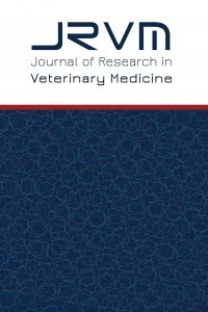Yarasa Algoritması ve Klonal Seçim Algoritmasının Optimizasyon Problemleri ile Performans Analizi
PERFORMANCE STUDY OF BAT ALGORITHM AND CLONAL SELECTION ALGORITHM FOR OPTIMIZATION TASKS
___
- 1. Adarsh, B. R., Raghunathan, T., Jayabarathi, T., and Yang, X. S. (2016) Economic dispatch using chaotic bat algorithm, Energy, 96, 666-675. doi: 10.1016/j.energy.2015.12.096.
- 2. Bin Basir, M.A. and Binti Ahmad, F. (2014) Comparison of Swarm Algorithms for Feature Selections/Reductions, International Journal of Scientific and Engineering Research, 5, 479-486. doi: 10.1109/ISPACS.2007.4445974.
- 3. Dandy, G.C., Simpson, A.R., and Murphy L.J. (1996) An improved genetic algorithm for pipe network optimization, Water Resources Research, 32, 449-458. doi: 10.1029/95WR02917.
- 4. De Castro and Von Zuben, F. J. (2000) An evolutionary immune network for data clustering, In Neural Network, Proceedings Sixth Brazilian Symposium on, 84-89. doi: 10.1109/SBRN.2000.889718.
- 5. Gong M, Jiao L, Zhang L and Ma W. (2007) Improved real-valued clonal selection algorithm based on a novel mutation method, International Symposium on Intelligent Signal Processing and Communication Systems, ISPACS 2007, 662-665. doi: 10.1109/ISPACS.2007.4445974.
- 6. Goyal, S., and Patterh, M. S. (2016) Modified Bat Algorithm for Localization of Wireless Sensor Network, Wireless Personal Communications, 86(2), 657-670. doi: 10.1007/s11277- 015-2950-9.
- 7. Generalized penalized function. (2015,June) .Retrieved from http://alroomi.org/benchmarks/unconstrained/n-dimensions/172-generalized-penalized-function-no- 1
- 8. Test functions and datasets. (2015, January). Retrieved from http://www.sfu.ca/~ssurjano/optimization.html.
- 9. Sindhuja, L. S., and Padmavathi, G. (2016) Replica Node Detection Using Enhanced Single Hop Detection with Clonal Selection Algorithm in Mobile Wireless Sensor Networks, Journal of Computer Networks and Communications. doi: 10.1155/2016/1620343.
- 10. Ulutas, B.H. and Kulturel-Konak, S. (2011) A review of clonal selection algorithm and its applications, Artificial Intelligence Review, 36(2), 117-138.doi:10.1007/s10462-011-9206-1.
- 11. Vatansever, F. and Şen, D. (2013) Design of PID Controller Simulator based on Genetic Algorithm, Uludağ University Journal of The Faculty of Engineering, 18(2), 7-18. doi: 10.17482/uujfe.33406.
- 12. Wolpert, D.H. and Macready, WG. (1997) No free lunch theorems for optimization, IEEE Transactions on Evolutionary Computation,1, 67-82. doi: 10.1109/4235.585893.
- 13. Yang X.S. (2010) A new metaheuristic bat-inspired algorithm. In Nature inspired cooperative strategies for optimization, Springer Berlin Heidelberg, NICSO 2010, 65-74. doi: 10.1007/978-3-642-12538-6-6.
- ISSN: 2148-4147
- Yayın Aralığı: 3
- Başlangıç: 2002
- Yayıncı: BURSA ULUDAĞ ÜNİVERSİTESİ > MÜHENDİSLİK FAKÜLTESİ
ARAÇLARIN KRİTİK ARALIK KABUL KARARLARININ PEKİŞTİRMELİ ÖĞRENMEYLE SİMÜLASYONU
Araçların Kritik Aralık Kabul Kararlarının Pekiştirmeli Öğrenmeyle Simülasyonu
SAĞLIK HARCAMASININ TAHMİNİNDE MAKİNE ÖĞRENMESİ REGRESYON YÖNTEMLERİNİN KARŞILAŞTIRILMASI
BİR EĞİTİM BİNASINDA ISIL KONFOR KOŞULLARININ ANALİZİ: İZMİR'DE BİR ALAN ÇALIŞMASI
GÜLBEN ÇALIŞ, Merve KURU, Berna ALT
LNG ORTAMINDA ÇALIŞAN TELSİZ DUYARGA AĞLARI İÇİN GİGAHERTZ KANAL MODELLENMESİ
GRİ STOK MODELİNİN İŞBİRLİKÇİ OYUN TEORİSİ İLE MALİYET DAĞITIMLARININ İNCELENMESİ
MEHMET ONUR OLGUN, GÜLTEKİN ÖZDEMİR, Sırma Zeynep ALPARSLAN GÖK
Ren Nehri'ndeki Düşük Debilerin Önceden Kestirimi İçin Model Geliştirilmesi
Pieter BOUWMA, Mehmet C. DEMIREL
Yarasa Algoritması ve Klonal Seçim Algoritmasının Optimizasyon Problemleri ile Performans Analizi
